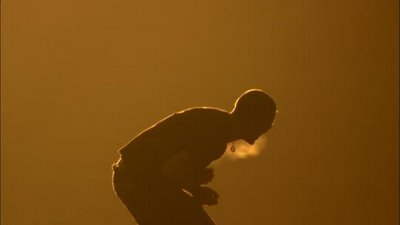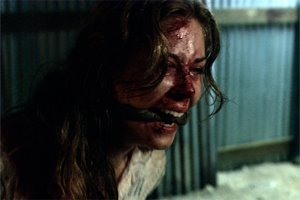
There are some uncanny resemblances between Eli Roth’s Hostel and Greg McLean’s Wolf Creek. Leaving aside for a moment the severed fingers, the biggest similarity is the starting point of each narrative. Each film begins with a group of young twenty something backpackers, travellers searching for excitement.

In Australian horror flick Wolf Creek, the subject matter is approached in an integrally different manner. It has been argued that the torture sequences in Hostel lack something and are, therefore, gratuitous. Wolf Creek addresses this issue with an ample smattering of motivation and psychology, making it a harder to film to watch as a result, even though the torture scenes are nowhere near as graphic or obscene as in Roth’s splatterfest.
The films were both released in 2005 so it would be pointless conjecture to argue for a straight forward rip-off of one film by the other. What is more important is that both films reference their genre traditions and influences. In Wolf Creek the influences become much more eclectic. Alongside The Texas Chainsaw Massacre and Halloween, there is also an amusing becoming very unsettling Crocodile Dundee reference and an excellent homage to vehicular violence as immortalised by Spielberg’s Duel.
This season of films as a whole deals with different types of road movie. Road movies begin with a journey, which the road has come to symbolise. The protagonists are introduced at a juncture in their lives. They are faced with a choice – always pre-determined by the genre – to stay or to go. To stay means to stagnate. Often, the choice to stay can also represent a danger or threat that propels the desire for flight. Both sides of this coin are neatly represented in that classic road movie Thelma and Louise. Originally, the leads choose their journey as a respite from their deeply unsatisfying lives. This soon becomes a necessity after the shooting of a rapist. They can no longer give up their journey as this would lead to their arrest. The other choice, the choice always taken in a road movie, represents freedom, change, and the possibility of a future. Inevitably, the road movie captures an irony. It is the road itself that is dangerous and that will lead to circumstances above and beyond what the protagonists have welcomed at the beginning of their journey. The road, rather than offering freedom and escape, easily manifests itself as the very thing that must be survived and escaped from. The journey is arrested and with it, the potential for freedom. The road will leave its mark on any that survive it.

Wolf Creek plays out as, from the start, as expected given the definition just given. Ben, Liz, and Kristy are young backpackers planning to drive from Western Australia to Sydney via Darwin and the world’s second biggest discovered meteor site Wolf Creek. However, things don’t quite go as planned. As in Hostel, there is a strong under current of the effect of tourism, especially the kind of backpacker gap year tourism that has rapidly become a necessary part of the transition into adulthood in Western society. In Wolf Creek this is shown both by the British backpackers Liz and Kristy, and by Ben who is born in Sydney but for whom the Outback is as alien as it is to the Brits.
Wolf Creek, the meteor site to which the backpackers are travelling, is a real life geographical phenomenon which, although long familiar to the local Djaru Aborigines, wasn’t discovered by Europeans until 1947. The road that the backpackers travel over is nothing more than a thin strip of assumed civility papered over a vast and unknowable region. It is in believing that this strip will hold and protect them that is the travellers biggest mistake. I wouldn’t like to suggest that the city and civilisation should be considered good and the Outback a savage place, far from it. Rather, the idea that you can tame or understand a such a terribly beautiful wilderness through such symbols of progress as an arbitrarily placed strip of tarmac, should be recognised as utterly misguided and naïve. Incidentally, the killer is also posited as a non-native of the wilderness. This is not a film about evil Aborigines and courageous colonists.
Wolf Creek was entirely shot on high definition digital cameras and transferred over to 35mm in post-production where the colour was enhanced. A technique famously used in Sin City. What the procedure does for Wolf Creek is nothing short of spectacular. The scenes in the outback are so crisp and clean, it makes the inevitable horror to come almost unbearable.
This film was subject to a fairly harsh critical reception, the violence and torture clearly a step too far for some. Many Australian critics staged walk-outs during screenings, disturbed not only by the sadism and gore present in the film, but the belief that McLean had somehow made an un-Australian movie. Surprisingly though, many critics, mainly horror aficionados, were rejecting the movie because of the ‘slow’, ‘boring’ build up. Surprising as the build up in Wolf Creek is intentionally prolonged and impressive, reminiscent of and surpassing in calibre the build up and character development in British horror flick The Descent. By the time blood starts to spill in Wolf Creek, the viewer is well and truly tied to the characters. You will care. You will invest in them. Enter mayhem.

The film’s ending is an enigma. It isn’t clear what it is supposed to mean for the rest of the film and in a way makes irrelevant the scenes before, stripping away the apparent motivation and psychology of the killer and replacing it with guesswork. The fact remains that Wolf Creek is a deeply disturbing, beautifully shot, and intense piece of horror cinema that is as much a tribute to the genre as it is an original and inventive work by an up and coming Australian director.
Film presented by Vee Uye
Labels: Australian Cinema, Eli Roth, Greg McLean, Hostel, Road Movie, Torture, Vee Uye, Wolf Creek



1 Comments:
With all this in mind and I agree with it all… Hostels website problematises the film even further than the film does in its own right. In www.hostelfilm.com the film opens its self up and frames itself in the real… with its “experience sections” and “true facts” sections where you can rate how much your life is worth etc. the experience of the Hostel film is widened and framed as something that has the possibility of truth. I’m not sure if this can all properly be taken into account with the “filmic experience” but if it can then the film slides even further into areas that Wolf Creek covers.
Wolf Creek and its seat in half reality and the “lies” it tells seem to cheapen the experience some, if it stood proud as a fiction film and a tale of the possible events that could occur it would have created a more frightening slasher film experience but the finishing lines that posit it as the reported tale as David says “make you feel had” but if its revelations where left to an outside source (such as a website) and the film stood without it crutch it would create something that sits better all-round.
When I’ve formulated an opinion on how it deals with the tourism angle I’ll be back, there seems to be something about colonisation in this as well but it’s been a very long day so far…
Post a Comment
<< Home